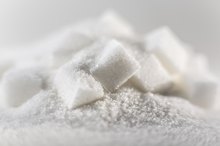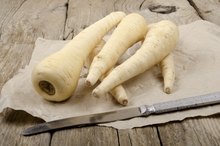Blood Sugar & Honeydew
The carbohydrates in honeydew, a type of melon, will elevate your blood sugar levels. As a general rule, any food or drink that contains more than 5 grams of carbohydrate per serving will affect your blood glucose. A serving of honeydew contains about 15 grams of carbohydrate. Honeydew contains two types of carbohydrate -- sugar and fiber -- but no starch.
Nutrition Facts
Honeydew, a good source of potassium, also provides vitamins A and C. A single serving of honeydew -- about 1 cup of diced melon -- contains 15.45 grams of total carbohydrate. Total carbohydrate includes all of the sugar, starch and fiber content in any given food or beverage. One cup of diced honeydew contains about 14 grams of total sugar and 1.4 grams of fiber. Sugar and starch carbohydrates both elevate your blood glucose levels, but fiber does not.
- Honeydew, a good source of potassium, also provides vitamins A and C. A single serving of honeydew -- about 1 cup of diced melon -- contains 15.45 grams of total carbohydrate.
Blood Sugar and Carbohydrates
Nutritional Content of Melons
Learn More
During digestion, sugar and starch are converted into glucose, which enters your bloodstream, causing an increase in your blood glucose levels. Fiber does not get broken down into glucose. Instead, it passes through your body undigested. When your body digests honeydew, all of the sugar -- sucrose and fructose -- is broken down into individual molecules of glucose, the simplest form of sugar. After you consume honeydew, the food matter makes its way to your stomach for digestion. During the process of digestion, the sugar carbohydrates in honeydew are broken down into glucose. The glucose molecules go through the lining of your small intestine and enter your bloodstream, causing your blood sugar levels to rise.
- During digestion, sugar and starch are converted into glucose, which enters your bloodstream, causing an increase in your blood glucose levels.
- After you consume honeydew, the food matter makes its way to your stomach for digestion.
Honeydew's Effects on Blood Sugar
Although honeydew provides important nutrition, it will elevate your blood glucose levels more than many fruits. The American Diabetes Association reports that honeydew melon falls into a medium glycemic index category, and they recommend you enjoy it. Raspberries, for example, contain less than half as much sugar -- 6 grams -- and nearly six times as much fiber -- 8 grams -- per 1-cup serving. Other good, fiber-rich fruit choices include bananas, apples and pears with skin, blueberries and oranges.
- Although honeydew provides important nutrition, it will elevate your blood glucose levels more than many fruits.
- The American Diabetes Association reports that honeydew melon falls into a medium glycemic index category, and they recommend you enjoy it.
Carbohydrate Intake
The Carb Count in Carrots
Learn More
Carbohydrates are your body’s main source of energy. Carbohydrates supply your body with glucose, which your cells require to function properly. About 45 to 65 percent of your total daily caloric intake should come from carbohydrates. This means that based on a 2,000-calorie diet, you should consume between 225 grams and 325 grams of total carbohydrate daily. Fruit, a nutrient-dense carbohydrate, is an important part of a healthy and balanced diet. In general, most adults should consume between 1-1/2 cups and 2 cups of fruit per day.
- Carbohydrates are your body’s main source of energy.
- This means that based on a 2,000-calorie diet, you should consume between 225 grams and 325 grams of total carbohydrate daily.
Related Articles
References
- Harvard Health Publications: Use Glycemic Index to Help Control Blood Sugar
- Harvard School of Public Health: Food Pyramids and Plates: What Should You Really Eat?
- Melons, honeydew, raw. FoodData Central. U.S. Department of Agriculture. Published April 1, 2019.
- University of Wisconsin Integrative Health. Managing dietary carbohydrates for better health. Updated October 2018.
- Gordon B. How much water do you need?. Academy of Nutrition and Dietetics. Updated March 2020.
- National Institutes of Health Office of Dietary Supplements. Folate fact sheet for health professionals. Updated March 11, 2020.
- Du H, Li L, Bennett D, et al. Fresh fruit consumption in relation to incident diabetes and diabetic vascular complications: A 7-y prospective study of 0.5 million Chinese adults. PLoS Med. 2017;14(4):e1002279. doi:10.1371/journal.pmed.1002279
- National Institutes of Health, Office of Dietary Supplements. Vitamin C fact sheet for health professionals. Updated February 27, 2020.
- Wolfram T. 5 top foods for eye health. Academy of Nutrition and Dietetics. Updated May 11, 2018.
- American Academy of Allergy Asthma and Immunology. Oral allergy syndrome (OAS) or pollen fruit syndrome (PFS).
- Foord K, MacKenzie J. Growing melons in the home garden. University of Minnesota Extension. Updated 2018.
- Brainard D, Heilig G, Manning J. How to grow melons. Michigan State University Extension. Updated May 23, 2016.
Writer Bio
Kathryn Gilhuly is a wellness coach based in San Diego. She helps doctors, nurses and other professionals implement lifestyle changes that focus on a healthy diet and exercise. Gilhuly holds a Master of Science in health, nutrition and exercise from North Dakota State University.









